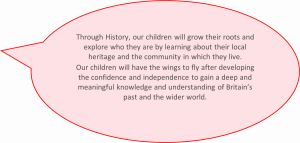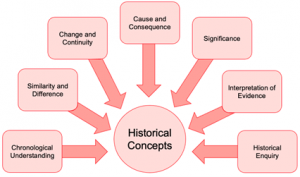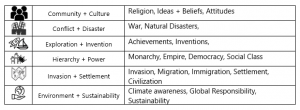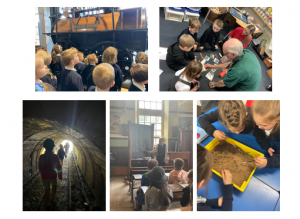
INTENT


IMPLEMENTATION AND CONTENT
Knowledge at the Heart of the Curriculum
Learning knowledge is not an endpoint in itself, it is a springboard to learning more knowledge. Each unit in our overview is underpinned by rich, substantive knowledge and ambitious vocabulary, whilst also ensuring children are developing their disciplinary knowledge (historical skills). Each unit of work is planned carefully to ensure concepts are taught in optimal order to support children’s understanding. As well as developing a breadth of historical knowledge, we want our children to become skilful historians.
Key historical concepts sit at the core of our curriculum to ensure the defining characteristics of the subject are ever-present.

‘Golden Threads’
We have identified a set of key historical concepts or ‘golden threads’, that children will repeatedly revisit throughout their time at Easington C of E Primary School. The ‘Golden Threads’ that are an integral part of our Humanities Curriculum are as follows:

Our Whole School Humanities Curriculum
Our curriculum consistently builds upon prior knowledge and learning is planned in a well-thought-out series of lessons (Medium Term Planning) that build progressively towards a defined end point at which the essential, non-negotiable knowledge pupils need to remember, is clearly outlined and assessed against.
Please click on the images below to view our long term Humanities planning:
Curriculum Enrichment
Where possible, within every unit of work we provide our children with memorable experiences that enhance their learning, develop a wide skill set, improve resilience and instil passion and interest. This might include a school trip, or a visitor coming into school.

IMPACT
Pupil Voice
We believe that if children have become knowledgeable historians, then they will be able to articulate their understanding with confidence. This is why pupil voice is an important to in assessing whether children have made progress. If a child is able to confidently formulate and explain their own responses to an overarching enquiry, then the curriculum and its delivery have been successful.
High Quality Outcomes
All children work in ‘Our Curriculum’ books to record their learning. The work in ‘Our Curriculum’ books is a culmination of a unit of work. We believe that beautiful work takes time. Therefore, children might take longer on fewer pieces of work to ensure they can deepen their knowledge and refine their work, taking time to redraft where needed. Below are some examples of our children’s high-quality history work featured in their ‘Our Curriculum’ book. Our history curriculum is also celebrated through displays throughout the school.
Assessment
Ongoing assessments take place throughout the year. Teachers use this information to inform future lessons; ensuring children are supported and challenged appropriately. This data is analysed to inform and address any trends or gaps in attainment.
Please see below for our Autumn Medium Term Planning :
Year 1 – Was the Great Fire of London more significant than the Great Fire of Newcastle?
Year 2 – What was The Gunpowder Plot?
Year 3/4 – Nothing really changed from the Stone Age to the Iron Age in Britain, did it?
Year 4/5 – Why did the Romans march through County Durham?
Year 6 – What was Durham like in the War?
Please see below for further links related to our History curriculum: